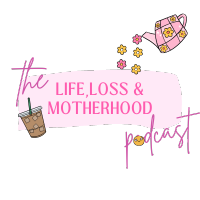Episode 23
Why normalizing pregnancy loss (stillbirth & miscarriage) is a big deal and how you can help.
Normalizing pregnancy loss involves making the conversation around stillbirth and miscarriage more common and accepted within society. The goal is to create an environment where individuals can openly discuss their experiences without fear of judgment or shame. It's interesting that we're trying to normalize something as profound as death, which society often tries to distance itself from due to its inherent discomfort and uncertainty. This avoidance is driven by the fear of the unknown and the discomfort that arises from facing the concept of mortality. However, avoiding conversations about pregnancy loss doesn't help the families affected by it.
The process of normalization plays a vital role in healing by addressing several crucial aspects:
1. Reducing Stigma: The stigma associated with pregnancy loss often prevents individuals from seeking support or sharing their stories. By normalizing the conversation, it becomes easier for people to seek help and discuss their experiences without fear of being judged.
2. Increasing Awareness: Normalizing a topic brings it into the public domain, enhancing understanding and knowledge. As awareness grows, empathy and support for those affected also increase.
3. Creating Connection: The normalization of pregnancy loss reminds people that they are not alone in their experiences. This shared connection can foster a sense of belonging and validation.
4. Encouraging Communication: Open discussions about normalized topics encourage people to talk openly about their emotions, experiences, and challenges. This communication can lead to a deeper understanding, empathy, and sharing of coping strategies.
5. Promoting Healing Strategies: Normalization of healing strategies like seeking therapy or practicing self-care can encourage individuals to adopt these practices without feeling unusual or weak.
To help normalize pregnancy loss, you can take several actionable steps:
1. Education and Awareness Campaigns: Utilize platforms like social media, podcasts, workshops, and community events to share information, stories, and resources. Educate people about the realities of pregnancy loss to counter misconceptions.
2. Promote Authentic Conversations: Create safe spaces for open and honest sharing. These spaces allow respectful, empathetic dialogue where people can express themselves without judgment.
3. Lead by Example: When influential figures or role models openly discuss and normalize these experiences, it sends a powerful message that these topics are important and should be discussed.
4. Media Representation: Showcase diverse and realistic portrayals of pregnancy loss in movies, TV shows, literature, and art. Accurate depictions contribute to the normalization process.
5. Collaborative Efforts: Partner with organizations, communities, and advocates sharing the goal of normalizing pregnancy loss. Collective efforts amplify impact and reach a broader audience.
6. Storytelling: Sharing personal stories humanizes the topic and helps others relate. It builds a sense of community and is integral to the healing process.
7. Consistency: Normalization is an ongoing process. Consistently discussing and advocating for the topic helps it become a natural part of conversations and reduces the novelty factor.
Ultimately, the goal is to move forward, not "move on." Healing is a continuous journey, and by focusing on identity building, finding joy, and practicing self-love, individuals can move forward while honoring their experiences and maintaining a sense of empowerment. Normalizing pregnancy loss is about recognizing its place in the tapestry of life and...


